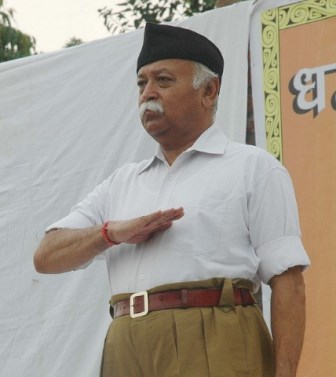 RSS chief Mohan Bhagwat in JammuVishal Dutta / Flickr / Creative Commons
RSS chief Mohan Bhagwat in JammuVishal Dutta / Flickr / Creative Commons
Ignoring paralyzing opposition in Parliament and private expressions of exasperation from their own political leader, the top leaders of India’s fundamentalist Hindu movement have mounted a vigorous defense of a campaign to bring Christian converts back to Hinduism.
“This is our own country, our Hindu rashtra,” or nation, said Mohan Bhagwat, head of the Rashtriya Swayasevak Sangh, a national organization that has been the ideological wellspring of India’s various groups devoted to a nationalistic expression of Hinduism. Bhagwat made the statement Dec. 20 in Kolkata, India’s third-largest city, during the golden jubilee celebration of the World Hindu Council, which claims to have “reconverted” several hundred thousand Christians and Muslims to Hinduism.
“Those who strayed were lured away. They were looted from us,” Bhagwat was variously quoted as saying by Indian news organizations. “When the thief is being caught and my property has been recovered, when I am taking back my own property, what is new in it?”
The next day, Amit Shah, president of the Bharatiya Janata Party, the political home to Hindu nationalism, responded to press questions about Bhagwat’s comments by issuing a challenge to the BJP’s opposition: Get behind BJP legislation that would outlaw forced conversions nationwide.
Seven of India’s 29 states have laws forbidding forced religious conversions. Ostensibly meant to protect individuals from unwelcome proselytizing, the laws instead are “frequently used as a pretext to disturb and disrupt church services as well as to harass, beat up and accuse Christian believers and leaders,” according to Open Doors International, a charity that supports Christians who are pressured because of their faith.
“What is happening across the nation is a planned conspiracy. They (Hindu nationalists) want to create an atmosphere where more parties will support a national anti-conversion bill,” A J Philip, a columnist who has written for leading national daily newspapers, told World Watch Monitor.
On Saturday, Dec. 20, the Vishwa Hindu Parishad, or World Hindu Council, claimed to have reconverted 500 members of 100 tribal Christian families in a ghar vapasi, or homecoming, programme at Arnai village near Valsad, in Gujarat state in western India.
The next day, competing Malayalam news channels were broadcasting images of 30 Christians embracing Hinduism at a reconversion ceremony at a Hindu temple in southern Kerala state – India’s Christian heartland where believers account for one fifth of the state’s 35 million people.
Earlier this month, 57 migrant Muslim families of ragpickers were reconverted under the watchful eyes of a Hindu fundamentalist outfit in front of news cameras.
The Dec. 20 and 21 reconversion events kept tensions running high in India’s Parliament, where three weeks of uproar from minority parties over conversions and violence toward Christians and other minorities has brought the government largely to a standstill.
“We cannot let the Parliament function when the people are terrorised,” Sitaram Yechury, a leader of India’s Communist Party, told the media Dec. 22. Yechury and other opposition party representatives have demanded that Prime Minister Nerandra Modi address the Parliament on the conversion controversy.
Modi, head of the BJP ticket that swept to a big election victory earlier this year, has been largely silent. News reports on Dec. 16 indicated Modi had scolded BJP members of Parliament, telling them their anti-minority rhetoric was hurting India’s image and undermining BJP efforts to shore up the economy.
“Prime Minister Modi is media savvy,” Philip, the newspaper columnist, told World Watch Monitor. “But his silence and refusal to address the issue in Parliament speaks volume about it.”